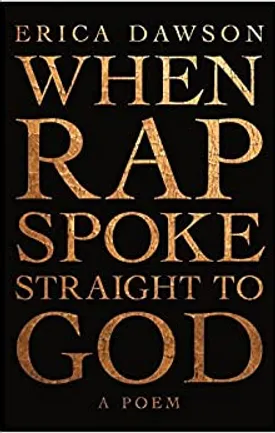When Rap Spoke Straight to God by Erica Dawson
The world of rap music has long held intriguing power and potential when it comes to expressing ideas and feelings in spoken word poetry. While much of the art form has traditionally been connected to personal exploration or commentary on current events and culture, Erica Dawson has opted to tap into a higher power in her latest poetry collection, When Rap Spoke Straight to God. In this personal journey, she dives deep into her relationship with faith and the larger spiritual realm.
Through her work, Dawson effectively bridges the divide between rap and religious musings. In doing so, she offers a roadmap for others to explore the possibilities of a platonic union between faith and rhyme. The poems tend to pendulate between the personal and divine, allowing her to present her innermost perspectives on her life and faith.
Many of the poems feature the same fire and immediacy of traditional rap, but Dawson takes it a few steps further by considering the underlying motivations and greater implications of her words. For example, her poem “Names” begins with a traditional rap-introduction, “Let me introduce my name, I’ll call it greatness/ I call it higher power, you can call it faith.” She then dives into a poem that explores her name in relation to her relationship with God.
Another poem, “Clamor,” uses the traditional rap format to express her need to be seen and heard on her spiritual journey. “I ain’t live a righteous life/I ain’t always followed the rules/But I won’t ever fail to write/A rap declaring my being/To be heard just like I sit/At the feet of my creator.”
Overall, the poems in When Rap Spoke Straight to God are poignant, sincere reflections on the nature of faith and our connection to the divine. As each poem takes a bit of the shock-value out of traditional rap, Dawson is able to communicate complex ideas and emotions as well as providing readers with thought-provoking perspectives on her personal relationship with faith.
The collection is perhaps most powerful when considered as a single piece, as the pieces flow seamlessly into one another, presenting the reader with an intimate view of Dawson’s unconditional faith and inner quest.
When Rap Spoke Straight to God is likely to resonate with readers who are looking for a respectful, thought-provoking exploration of faith and faith-inspired poetry. Readers who are touchy about the idea of rap poetry and spirituality will likely be pleasantly surprised by the poignant, reflective language and innovative exploration of these topics.

